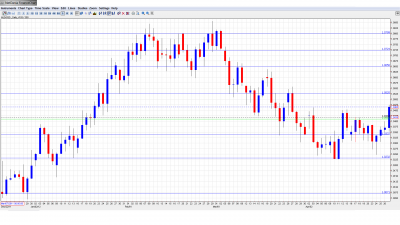AUD/USD dropped to the mid-1.02 level, but rallied late in the trading week, climbing above 1.04, to close at 1.0465. The upcoming week is very busy, with eleven releases, including the key Cash Rate. Here is an outlook for the Australian events, and an updated technical analysis fopr AUD/USD.
The aussie took full advantage of weak US data and the announcement by the Federal Reserve that it would not raise interest rates in the near future. All eyes will be on the Australian central bank this week, which is expected to cut interest rates to help jumpstart the weak economy. Lower rates are almost a given, but the magic question is, by how much?
Updates: The aussie remains strong, with AUD/USD trading at 1.0428. The markets will be carefully watching the interest rate announcement by the central bank on Tuesday. The central bank caught analysts and the markets by surpise, as the bank lowered a key interest rate by 0.50%, to 3.75%. The markets had predicted a cut of 0.25%.This marked the largest drop in interest rates since 2009. Predictably, the aussie paid the price, dropping over a full cent on the news, as AUD/USD is trading at 1.0314. With the interest rate headlines, the Commodity Prices release on Tuesday was almost forgotten. That may not be such a bad thing, as the indicator looked absolutely awful in April, dropping by 4.2%. The indicator has been falling every month since February 2011, but this reading was particularly weak, as the indicator dropped into negative territory for the fist time in over two years. AUD/USD is steady, and was trading at 1.0323. Services PMI slumped in April, as the index recorded a reading of 39.6 points. This marks the index’s poorest performance in over three years. The RBA will release a Monetary Policy Statement on Friday. The quarterly report could prove to be of more interest than usual, given the surprising 0.50% rate cut by the central bank earlier in the week. The Australian continues to lose ground, falling below the 1.03 level. AUD/USD was trading at 1.0291.
AUD/USD graph with support and resistance lines on it. Click to enlarge:
- MI Inflation Gauge: Monday, 00:30. Inflation last month reached its highest level in 2012, coming at 0.5%. Higher inflation reflects greater economic activity, and is bullish for the Australian dollar.
- HIA New Home Sales: Monday, publication time tentative. After a disastrous decline in February, the indicator bounced back in March, jumping 3.0%. Will the indicator provide another strong reading this month?
- Private Sector Credit: Monday, 1:30. The indicator posted a 0.3% increase in March. The markets are calling for a slight increase this month of 0.4%.
- AIG Manufacturing Index: Monday, 23:30. The index disappointed the markets in April, dropping below the 50.0 level for the first time in 2012. If the index can rise above 50, this would indicate some modest growth in the manufacturing sector.
- Chinese Manufacturing PMI: Tuesday, 1:00. The index recorded a reading of 53.1 in April, well above the market forecast. The markets are predicting a slight increase to 53.6. Given that the China is Australia’s most important trading partner, positive PMI data would be bullish for the aussie.
- HPI: Tuesday, 1:30. The index has recorded four consecutive declines, indicating weak activity in the housing sector. The market forecast calls for a slight improvement in April, but still in negative territory, at -0.3%.
- Cash Rate: Tuesday, 4:30. The key interest rate has been steady at 4.25% since last November. The market forecast calls for a cut in rates, to 4.0%.
- RBA Rate Statement: Tuesday, 4:30. If the central bank does not lower rates to 4.0% as expected, all eyes will be on the RBA Rate Statement, and such a move will likely affect the direction of the Australian dollar.
- Commodity Prices: Tuesday, 6:30. The change in commodity prices continues to decline, a worrying trend that has continued since 2010. The market forecast for April was only 2.7%, the lowest change since 2007. Will the May reading be even lower?
- AIG Services Index: Wednesday, 11:30. The index has recorded two consecutive readings below the 50.0 level, indicating contraction in the services industry. The markets are sure to frown if the index posts another weak reading in May.
-
RBA Monetary Policy Statement: Friday, 1:30. Traders should pay attention to this quarterly statement, especially if the central bank does not lower interest rates to 4.%, as expected. A report that is more hawkish than forecast is bullish for the Australian dollar.
* All times are GMT
AUD/USD Technical Analysis
AUD/USD opened at 1.0382. The pair dropped to a low of 1.0247, as the support level of 1.2030 (discussed last week) held firm. The pair then climbed sharply, as it moved all the way up to 1.0474, closing the week at 1.0465.
Technical levels from top to bottom:
We begin with resistance at 1.0990, which was last breached in August 2011. Next, there is resistance at 1.0886. This is followed by resistance at the round number of 1.08, which AUD/USD last tested in February. Below, there is resistance at 1.0724. This line has strengthened as the pair has traded at lower levels since early March.
This is followed by strong resistance at 1.0650. Next, there is resistance at 1.0525, which saw a lot of movement by the pair in March. This line Below, 1.0402 continues to be a fluid line, as it was again breached this week on the upswing by AUD/USD. It was a providing resistance just last week, but is now in a weak support role.
Close by, 1.0340 is providing the pair with support. This line has been repeatedly tested in April, and was breached this week. Next there is support at 1.0230. This line has held steady since January.
Below, the pair is supported at 1.0080, which is protecting the all-important parity level. This level has not been breached since December 2011, and looks safe in the short-term. The final support level for now is at 0.9964, a strong support level dating back to December 2011.
I am neutral on AUD/USD.
A weak Australian economy and slower growth in China do not bode well for the Australian dollar. However, the aussie has proven to be hard to read, as last week’s late rally reminded the markets. With the US churning out some weak numbers, there is room for the aussie to move up, if Chinese and Australian indicators show some improvement. Of course, all bets are off if the central bank makes any unexpected moves when it sets interest rates this week.
The Aussie sometimes moves in tandem with gold. You can trade binary options on gold using this technical analysis.
Further reading:
- For a broad view of all the week’s major events worldwide, read the USD outlook.
- For EUR/USD, check out the Euro to Dollar forecast.
- For the Japanese yen, read the USD/JPY forecast.
- For GBP/USD (cable), look into the British Pound forecast.
- For the Australian dollar (Aussie), check out the AUD to USD forecast.
- For the New Zealand dollar (kiwi), read the NZD forecast.
- For USD/CAD (loonie), check out the Canadian dollar forecast.

